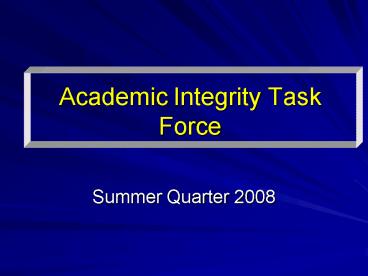Academic Integrity Task Force - PowerPoint PPT Presentation
1 / 23
Title:
Academic Integrity Task Force
Description:
Why Do Students Cheat? According to McCabe- peer behavior has the most influence ... Profession/School Specific Codes of Professionalism and Academic Integrity ... – PowerPoint PPT presentation
Number of Views:91
Avg rating:3.0/5.0
Title: Academic Integrity Task Force
1
Academic Integrity Task Force
- Summer Quarter 2008
2
Charge of the Task Force
- Convene an Interprofessional Task Force with
broad representation to examine Professionalism
and Academic Integrity at RFUMS and draft a White
Paper with the task force findings (what we have)
and recommendations (what we may want to have) - Process
3
Task Force Members
- Marc Abel
- Rebecca Durkin
- Sarah Garber
- Ken Kessler
- Cathy Lazarus
- Monica Oblinger
- Nancy Parsley
- Neal Patel, student representative
- Wendy Rheault
- Sandra Salloway
- Renwick Taylor, student rep.
- Sally Venus
- John Vitale, Task Force Chair
4
Contextualizing the Issue
5
Definition
- Academic Integrity encompasses
- Honesty
- Trust
- Fairness
- Respect
- Responsibility
- (Center for Academic Integrity at Clemson
- The Fundamental Values of Academic Integrity)
6
Academic Integrity Data
- Center for Academic Integrity Data 75 of
college students cheat at least once and more
than half dont think it is a serious offense - Cheating at all levels grade school through to
professional programs
7
College CheatingComparison of 1963 to 1993
8
Methods of CheatingMcCabe et al
9
Research on Professional Schools
- 84 of undergraduate business students and 72 of
engineering students cheated at least once (Mohr
et al presentation)
10
Medical Professions
- Rennie and Crosby reported 2 to 56 of medical
students would engage in unethical behaviours-
forging MD signature (9) or falsifying notes
(32) - Previous cheating in high school predicted
cheating in medical school - 50 of pharmacy students admitted to being
involved in activities traditionally defined as
dishonest however only 16 said they cheated
(Mohr, Mabey, Fell Ingram)
11
Does College Cheating Transfer to the Workplace?
- Academic dishonesty is associated with workplace
dishonesty - Harding et al past behavior can be a strong
indicator of future behavior - Harding et al reported that 62 of students who
cheated in high school also cheated in college - 64 who cheated in high school violated workplace
policies
12
Transfer to Medical Practice
- Unprofessional behavior in medical school is
associated with disciplinary action by a state
medical board - Three unprofessional behaviors
- Poor reliability and responsibility (8x more
likely) - Lack of self improvement (3x more likely)
- Poor initiative and motivation
- (Papadakis M, Teherani A et al, NEJM, Dec 2005)
13
Why Do Students Cheat?
- According to McCabe- peer behavior has the most
influence - Peer approval increases cheating and peer
disapproval decreases cheating - Students who dont cheat feel disadvantaged
14
Why Do Students Cheat?
- McCabe et al reported that certain
characteristics lead to cheating - Pressure for grades
- Parental Pressure
- Poor self image
- Lack of responsibility
15
Why Do Students Cheat?
- Faculty issues as reported by students
- Faculty look the other way
- Too much homework
- Trivial assignments
- Faculty do a poor job in the class
- Faculty dont remove opportunities to cheat
16
Why Do Students Cheat?
- Outdated policies on cheating
- Weak punishments
- Institutions dont try hard enough to stop
cheating - Students arent involved in making the policy and
the judicial process - (Mohr,Mabey, Fell Ingram, 2008 presentation)
17
Student Views on Faculty
- Teacher should pay attention to gestures (etc)
- Give different forms of exam
- Have more proctors
- Teachers shouldnt leave exams in office
- All personal items stashed away
- Students shouldnt be allowed to leave the room
- Students should know consequences of cheating
- (Mohr,Mabey, Fell Ingram, 2008 presentation)
18
Honor Codes
- McCabe et al found that academic dishonesty was
higher in institutions with no honor code, and
was less at schools with an honor code - Peer behavior and acceptance had a significant
influence on cheating - Student involvement is the key to successful
implementation of honor codes
19
Honor Codes
- Stress responsibility of students
- Policies are clearly delineated
- Includes written pledges by student
- Institution clearly communicates policies
campus-wide regarding dishonesty - Students play significant role in judicial
process
20
Academic Integrity at RFUMS
21
Artifacts of Academic Integrity
- RFUMS Student Council (Honor Council)
- Educational Affairs Committee
- Profession/School Specific Codes of
Professionalism and Academic Integrity - Draft Standards for Student Conduct Policy
Student Affairs - Draft Code of Conduct for all University
faculty, staff, volunteers, and others who
exercise authority on behalf of or in affiliation
with the University. Compliance Office
22
Draft Recommendations
- Academic Integrity as core University value
- Academic integrity is a shared responsibility of
students, faculty, staff and administration - Clarify expectations for students
- Reduce opportunities for cheating
- Prompt and equitable enforcement of policies
23
Questions Comments































